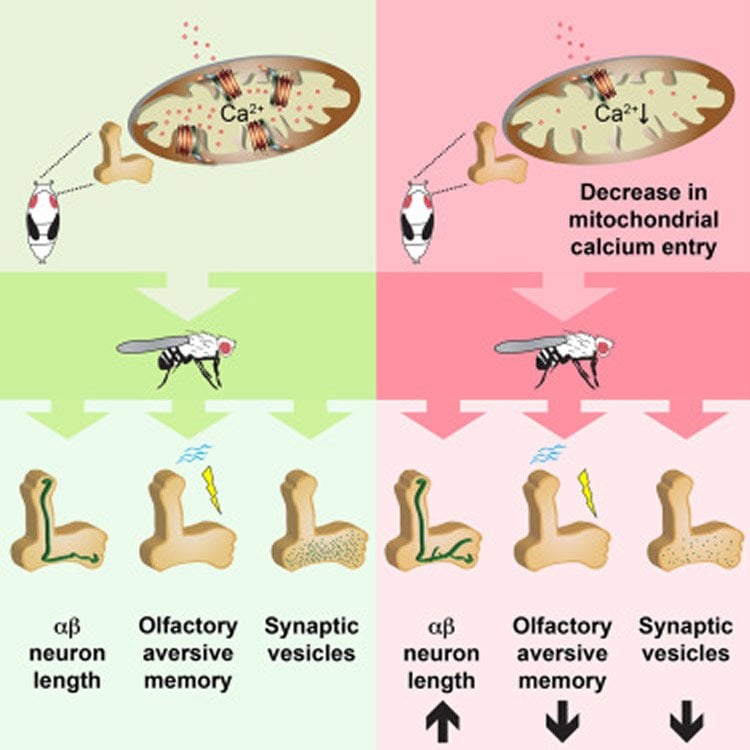Summary: A new study reports on how calcium in mitochondria can impact brain development and adult cognition.
Source: Scripps Research Institute.
While calcium’s importance for our bones and teeth is well known, its role in neurons–in particular, its effects on processes such as learning and memory–has been less well defined.
In a new study published in the journal Cell Reports, scientists from the Florida campus of The Scripps Research Institute (TSRI) offer new insights how calcium in mitochondria–the powerhouse of all cells–can impact the development of the brain and adult cognition.
In particular, the team showed in fruit flies, a widely used model system, that blocking a channel that brings calcium to the mitochondria, called “mitochondrial calcium uniporter,” causes memory impairment but does not alter learning capacity.
“When we knocked down the activity of the uniporter, we found that flies have a deficit memory,” said Ron Davis, chair of the TSRI’s Department of Neuroscience. “Intact uniporter function is necessary for full and complete memory in the adult fly. What surprised us is that they were still able to learn–albeit with a fleeting memory. But we thought they wouldn’t be able to learn at all.”
The mitochondrial calcium uniporter protein, first identified in 2011, allows calcium ions to move from the cell’s interior into mitochondria–like coal moving through a shoot into a furnace room. It is regulated by other proteins known as MICU1, MICU2 and EMRE. Davis noted that human patients with mutations in MICU1 can exhibit learning disabilities.

“The new study’s conclusion is that mitochondrial calcium entry during development is necessary to establish the neuronal competency for supporting adult memory,” said TSRI Research Associate Ilaria Drago, the first author of the study.
Drago noted the team found evidence that inhibiting mitochondrial calcium uniporter function led to a decrease in the content of synaptic vesicles (miniscule sacs within the cell where various neurotransmitters are stored) and an increase in the length of axons (the slender filaments of neurons).
While these structural problems were clearly observed, she added, what they mean in terms of neuronal development remains tantalizingly unclear. “The discovery of a developmental role for the mitochondrial calcium uniporter complex in regulating memory in adult flies is especially intriguing and deserves more exploration,” said Davis.
Funding: The study, “Inhibiting the Mitochondrial Calcium Uniporter during Development Impairs Memory in Adult Drosophila,” was supported by the National Institutes of Health (grants R37NS19904 and R01NS052351) and the Iris and Junming Le Foundation.
Source: Eric Sauter – Scripps Research Institute
Image Source: This NeuroscienceNews.com image is credited to the researchers/Cell Reports.
Original Research: Full open access research for “Inhibiting the Mitochondrial Calcium Uniporter during Development Impairs Memory in Adult Drosophila” by Ilaria Drago and Ronald L. Davis in Cell Reports. Published online August 25 2016 doi:10.1016/j.celrep.2016.08.017
[cbtabs][cbtab title=”MLA”]Scripps Research Institute. “Shedding New Light on Calcium’s Role in Memory and Learning.” NeuroscienceNews. NeuroscienceNews, 26 August 2016.
<https://neurosciencenews.com/calcium-memory-learning-4915/>.[/cbtab][cbtab title=”APA”]Scripps Research Institute. (2016, August 26). Shedding New Light on Calcium’s Role in Memory and Learning. NeuroscienceNews. Retrieved August 26, 2016 from https://neurosciencenews.com/calcium-memory-learning-4915/[/cbtab][cbtab title=”Chicago”]Scripps Research Institute. “Shedding New Light on Calcium’s Role in Memory and Learning.” https://neurosciencenews.com/calcium-memory-learning-4915/ (accessed August 26, 2016).[/cbtab][/cbtabs]
Abstract
Inhibiting the Mitochondrial Calcium Uniporter during Development Impairs Memory in Adult Drosophila
Highlights
•MCU and MICU1 are required in mushroom body neurons for memory but not learning
•Inhibiting mitochondrial calcium entry during development impairs memory in adult flies
•Inhibiting the uniporter reduces synaptic vesicles in mushroom body neurons
•Inhibiting the uniporter lengthens the axons of the αβ mushroom body neurons
Summary
The uptake of cytoplasmic calcium into mitochondria is critical for a variety of physiological processes, including calcium buffering, metabolism, and cell survival. Here, we demonstrate that inhibiting the mitochondrial calcium uniporter in the Drosophila mushroom body neurons (MBn)—a brain region critical for olfactory memory formation—causes memory impairment without altering the capacity to learn. Inhibiting uniporter activity only during pupation impaired adult memory, whereas the same inhibition during adulthood was without effect. The behavioral impairment was associated with structural defects in MBn, including a decrease in synaptic vesicles and an increased length in the axons of the αβ MBn. Our results reveal an in vivo developmental role for the mitochondrial uniporter complex in establishing the necessary structural and functional neuronal substrates for normal memory formation in the adult organism.
“Inhibiting the Mitochondrial Calcium Uniporter during Development Impairs Memory in Adult Drosophila” by Ilaria Drago and Ronald L. Davis in Cell Reports. Published online August 25 2016 doi:10.1016/j.celrep.2016.08.017






